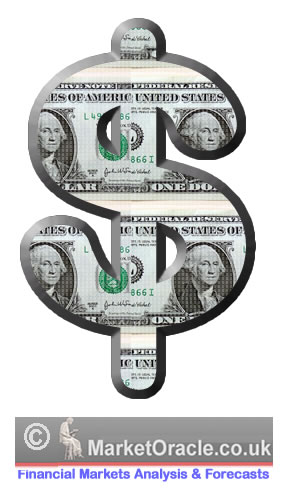Economic Green Shoots with No Roots
Stock-Markets / Financial Markets 2009 May 22, 2009 - 01:44 AM GMTBy: PaddyPowerTrader
 U.S. asset markets were savaged yesterday. The combined smell of declining equities, bonds and the dollar is not a pleasant one. Risk takers now realise that policy makers are naked. S&P’s revision of the U.K. rating outlook has sent a shockwave, it seems. Public deficit cannot keep running at 13% per year (both the U.K. and U.S. deficits will be of that size this year), future generations can’t afford it. Zealous Quantitative Easing (QE) will also lead to long-term inflation fears.
U.S. asset markets were savaged yesterday. The combined smell of declining equities, bonds and the dollar is not a pleasant one. Risk takers now realise that policy makers are naked. S&P’s revision of the U.K. rating outlook has sent a shockwave, it seems. Public deficit cannot keep running at 13% per year (both the U.K. and U.S. deficits will be of that size this year), future generations can’t afford it. Zealous Quantitative Easing (QE) will also lead to long-term inflation fears.
Though the QE route will be continued, money creation will not be saving us from all our sins. VIX has increased from below 27 to 31 over the past couple of days. It is a bit early to take conclusions, but I fear that the risk takers’ good run is coming to an end. Both bonds and stocks sold off yesterday. The dollar index reached a new year-to-date low and 10 Year U.S. Treasury bond yields are nearing 3.5%. Not what Doctor Bernanke ordered.
Today’s Market Moving Stories
- Bill Gross, manager of the world’s biggest bond fund, warned that the U.S. will eventually lose its top AAA credit rating, a fear that has spooked financial markets and could keep the dollar, stocks and bonds under heavy selling pressure. The U.S. will face a downgrade in “at least three to four years, if that, but the market will recognise the problems before the rating services.” In my view it’s a question of are any of the rating agencies BRAVE enough to downgrade the United States?
- Moody’s rating agency has rushed to reassure investors, saying that the U.K. and U.S. AAA ratings are safe… for now. Moody’s spokesman says the U.S. rating remains AAA and stable and points to the credit opinion released on May 6: “Structural fundamentals, political stability, and still favourable post-crisis economic prospects support the stable outlook for the AAA ratings of the United States. The government’s ability to deal with the credit crisis and recession without permanently impairing its balance sheet and the economy’s ability to rebound following the crisis will also be rating considerations.” What might change the U.S. AAA rating: “If the current upward trend in government debt were to continue and become irreversible, the rating could come under downward pressure. The trend and the outlook would be more important than any particular level of debt.”
- US Treasury Secretary Tim Geithner has also been quick to promise a more prudent fiscal policy. He said that the budget deficit should be cut to 3% of GDP and he is committed to sustainable deficit levels.
 But headlines like this one flourish this morning: “Bonds plunge as U.S. assets come under pressure.”
But headlines like this one flourish this morning: “Bonds plunge as U.S. assets come under pressure.”
- US Federal regulators seized Florida’s BankUnited FSB, the biggest bank failure this year, one that the Federal Deposit Insurance Corp. estimates will cost its weakened insurance fund $4.9 billion.
- The Bank of Japan (BOJ) slightly upgraded its assessment on the economy for the first time in nearly three years, while keeping interest rates on hold as it takes stock of some signs of recovery in the economy. The BOJ said the economy was deteriorating but exports and output were levelling out, ditching its assessment of the past several months that the economy was deteriorating sharply. The decision to keep rates on hold was made by a unanimous vote, as widely expected.
- China reportedly consumed 31.47m metric tons of oil in April according to a Platts report which is a 4% gain yoy and is the first gain in six months suggesting the demand for oil is starting to build there once again.
- The Herald Tribune notes that “China is growing more picky about which American debt it is willing to finance, and is changing laws to make it easier for Chinese companies to invest abroad the billions of USDs they take in each year by exporting to America.” It notes that that although China stepped up its lending to the American government over the winter, it virtually stopped putting fresh money into USDs. It highlights that this combination was possible because China had been selling the debt of government-sponsored enterprises like Fannie Mae and Freddie Mac in a hurry to buy Treasuries. It also notes that new data shows that China is also trading long-term Treasuries for short-term notes, “highlighting Beijing’s concerns that inflation will erode the USD’s value in the long run as America amasses record debt.”
- AIB’s Polish franchise Bank Zachodni fell 5.5% yesterday after speculation that provisions at the bank could rise as much as 64% this year. As a result, provisions of as much as 600m zloty could be required as the country faces its worse slowdown in almost a decade. The group recently reported a 51% fall in net income for Q1.
- The Onion on those Green Shoots.
U.K. AAA Rating Put On Negative Watch
On the topic du jour of the S&P’s action on the U.K.’s sovereign rating - obviously, the knee jerk reaction is bad for GBP. However, on the positive side, this puts political pressure on the government to improve the public finances. S&P say U.K. debt burden could approach 100% of GDP and remain near that level in the medium term. Look at the fiscal scenarios. With the output gap closing by 2020 and no fiscal adjustment beyond current plans, the U.K. Government Debt (GD) rises from 52% in 2008 to 136% in 2020, a deterioration of 84%. The only major country that is worse is Japan but they are NOT triple AAA rated by all the agencies. On the same measure the next most vulnerable country is the U.S. Their Government Debt is expected to rise from 66% to 136% by 2020 - a deterioration of 66%. So the rate of UK deterioration is worse but the levels are the same in 2020. Meanwhile, in Italy the deterioration is small. In Germany the deterioration and level is NOT likely to see them put on watch. France however has the next biggest problem. The smaller periphery countries have already been reviewed.
What does the UK news today mean for GBP? As I mentioned, the announcement has dealt a blow to GBP. However, as I discuss above, the expected fiscal deterioration in the UK will not be isolated to the UK. If the same were to happen in the US the implications will be have a much greater impact on the dollar than it has on GBP. But are they brave enough…

The Latest Instalment Of The Irish NAMA Saga
Press reports this morning that Irish banks have been given until Monday to give a full breakdown of their development loan books. This includes the €60 billion in direct development loans and the €20/30 billion associated loans across the banking sector. The NTMA is seeking detail on the top 50-75 borrowers. It appears that a steering committee from the Dept. of Finance, NTMA and the Attorney General is planning how NAMA will be set up and run. It appears the clock has been speeded up on the NAMA initiation process. It is also reported separately today that the lenders will be offered 10% of the value of the recovered loans as an incentive to encourage the banks collection policy on loans migrating to NAMA. The move is similar to that offered in Indonesia.
The Irish Times also suggests that the legislation to set up the organisation will hopefully be published before the Dail’s summer break at the end of July and be passed in early September. The agency is planning to deal initially with the loans of Bank of Ireland, Allied Irish Banks and EBS, while the government has not made a decision over whether Anglo Irish Bank will be included. This contradicts a statement from Finance Minister Brian Lenihan in the Dail on May 13th, so I am are not sure this is accurate. It would not make any sense to proceed with NAMA without including Anglo Irish Bank (note that its results are out next week, the rumour is that they will be awful), which is the joint leading player in the property market with some of the largest client specific exposures. The intention is to get the banks to set up Special Purpose Vehicles and move these loans across. While day-to-day administration of the loans will still be done by the banks, for which they may be paid a fee, NAMA will be calling the shots.
Quickie: What’s an Offaly Rabbi’s favourite whiskey?
Tullamore Dew.
And Finally… Obama Free Credit Report Song
Disclosures = None
By The Mole
PaddyPowerTrader.com
The Mole is a man in the know. I don’t trade for a living, but instead work for a well-known Irish institution, heading a desk that regularly trades over €100 million a day. I aim to provide top quality, up-to-date and relevant market news and data, so that traders can make more informed decisions”.
© 2009 Copyright PaddyPowerTrader - All Rights Reserved
Disclaimer: The above is a matter of opinion provided for general information purposes only and is not intended as investment advice. Information and analysis above are derived from sources and utilising methods believed to be reliable, but we cannot accept responsibility for any losses you may incur as a result of this analysis. Individuals should consult with their personal financial advisors.
PaddyPowerTrader Archive |
© 2005-2022 http://www.MarketOracle.co.uk - The Market Oracle is a FREE Daily Financial Markets Analysis & Forecasting online publication.




